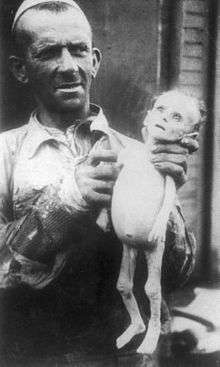
~ Elie Wiesel
Auschwitz concentration camp (German: Konzentrationslager Auschwitz [ˈaʊʃvɪts]) was a network of concentration and extermination camps built and operated by the Third Reich in Polish areas annexed by Nazi Germany during World War II. It was the largest of the German concentration camps, consisting of Auschwitz I (the Stammlager or base camp); Auschwitz II–Birkenau (the Vernichtungslager or extermination camp); Auschwitz III–Monowitz, also known as Buna–Monowitz (a labor camp); and 45 satellite camps.
Quotes
- He also expressed “surprised disapproval that Jewish Special Detachments (Sonderkommandos) were willing, in return for a short extension of their own lives, to help with the gassing of members of their own race.”
- The Face of the Third Reich, by Joachim C. Fest, page 285. Quoted in Awake! magazine, in the article The Holocaust—Yes, It Really Happened!, April 8, 1989.
- Some of the one-sided perfectionist pride of the expert comes out in Höss’s statement: ‘By the will of the Reichsführer of the SS [Heinrich Himmler], Auschwitz became the greatest human extermination centre of all time,’ or when he points out with the satisfaction of the successful planner that the gas chambers of his own camp had a capacity ten times greater than those of Treblinka.
- The Face of the Third Reich, by Joachim C. Fest.
- Auschwitz, the meaning of pain
The way that I want you to die
Slow death, immense decay
Showers that cleanse you of your life
Forced in like cattle
You run stripped of your life's worth
Human mice, for the Angel of Death
Four hundred thousand more to die- Jeff Hanneman, Angel of Death, Reign in Blood (1986)
- Believe me, it wasn’t always a pleasure to see those mountains of corpses and smell the perpetual burning.
- Rudolf Höss, quoted in The Spectator, vol.224 (1970), p. 211.
- The prisoners [transferred to labor camps] would have been spared a great deal of misery if they had been taken straight into the gas chambers at Auschwitz.
- Rudolf Höss, commandant of Auschwitz. Awake! magazine, The Holocaust—Yes, It Really Happened!, April 8, 1989.
- The road to Auschwitz was built by hate, but paved with indifference.
- Ian Kershaw, as quoted in Popular Opinion and Political Dissent in the Third Reich: Bavaria 1933-45 (1983), by I. Kershaw, p. 277.
- Auschwitz existed within history, not outside of it. The main lesson I learned there is simple: We Jews should never, ever become like our tormentors …
Since 1967 it has become obvious that political Zionism has one monolithic aim: Maximum land in Palestine with a minimum of Palestinians on it. This aim is pursued with an inexcusable cruelty as demonstrated during the assault on Gaza. The cruelty is explicitly formulated in the Dahiye doctrine of the military and morally supported by the Holocaust religion.
I am pained by the parallels I observe between my experiences in Germany prior to 1939 and those suffered by Palestinians today. I cannot help but hear echoes of the Nazi mythos of "blood and soil" in the rhetoric of settler fundamentalism which claims a sacred right to all the lands of biblical Judea and Samaria. The various forms of collective punishment visited upon the Palestinian people -- coerced ghettoization behind a "security wall"; the bulldozing of homes and destruction of fields; the bombing of schools, mosques, and government buildings; an economic blockade that deprives people of the water, food, medicine, education and the basic necessities for dignified survival -- force me to recall the deprivations and humiliations that I experienced in my youth. This century-long process of oppression means unimaginable suffering for Palestinians.
- Hajo Meyer, "An Ethical Tradition Betrayed," huffingtonpost.com, Jan. 27, 2010. Retrieved on March 27, 2010.
- More people kept coming, always more, whom we hadn’t the facilities to kill. . . . The gas chambers couldn’t handle the load.
- Franz Suchomel, SS officer, Awake! magazine, The Holocaust—Yes, It Really Happened!, April 8, 1989.